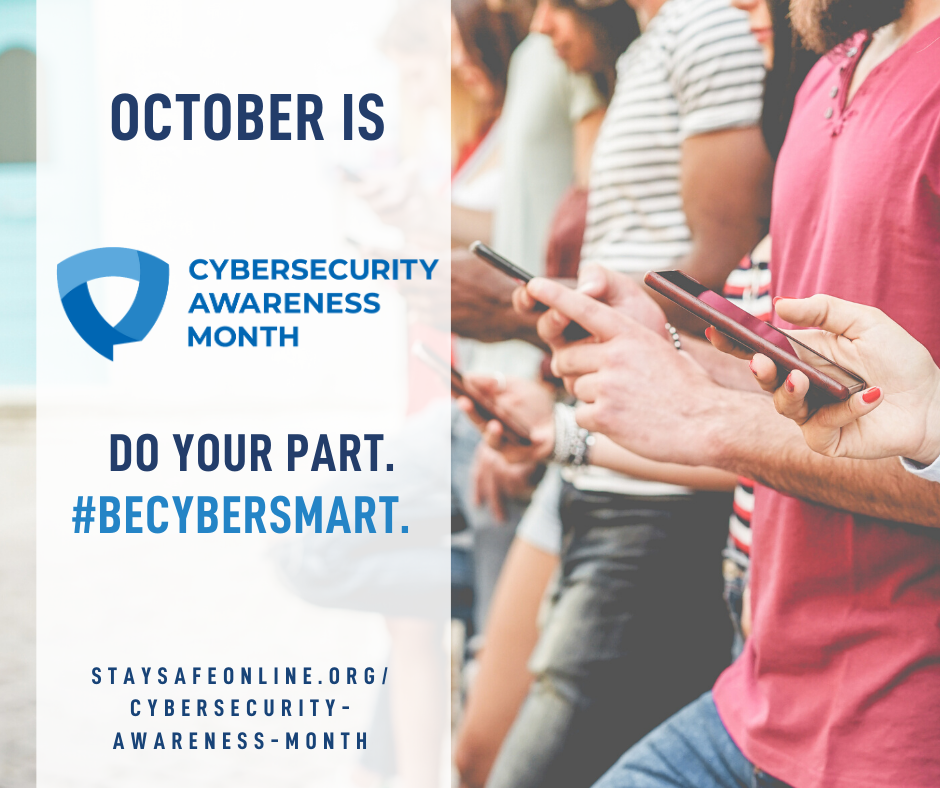We have recognized cyber security awareness month over the years with a variety of topics. In an effort to protect ourselves and the data we work with, we invite you to explore all the ways you can play a part in staying safe online.
2022
- Multi-Factor Authentication (MFA) – a refresher on how it works with our @ssndcp.org accounts and the ways it has been a successful deterrent for criminals and keeping our network and data safe.
2021

Week 1: Trick or Threat?
October is upon us, reminding us to make choices every day to keep cybersecurity threats away. Each week this month we will provide resources to help us improve our security awareness. In week one we cover protecting against a “phish”, ways to spot a phishing attempt, what to do if you think you’ve been successfully phished, and a fun quiz to test your skills.
Week 2: Malware comes in many forms
Malware, short for “malicious software,” refers to any intrusive software developed by cybercriminals to steal data and damage or destroy devices. Examples of common malware include viruses, worms, Trojans, spyware, adware, and ransomware. A few of the common ways it can infiltrate computers include if a malicious email attachment is opened, an infected USB/flash or external hard drive inserted, or if one simply visits a compromised or hacked web site. In the last week alone, our security software (Panda) blocked nearly 1,500 malicious web sites! Unfortunately, malware can still sneak thru Panda or any security software but you can do your part and be proactive in trying to prevent as well as protect your data should something happen. Learn more about malware and view specific examples, along with ways you can try to prevent. If you have yet to install Panda, we invite you to install using our guide to protect your computer and data. Another step to take is to utilize OneDrive. It allows you to back up your files so should an infection occur you have a chance of recovering your data (documents, pictures, etc.). If you have questions, please reach out to us at 1-800-373-7521 or helpdesk@ssndcp.org.
Week 3: Double your login protection
A topic that nearly all of us are familiar with – multi-factor authentication (MFA)! Last month, all @ssndcp.org accounts were required to add the extra layer of security. MFA provides protection in the event your password is hacked through phishing, data leaks or guessing. It steps in to save the day and shuts down unauthorized access to your account, protecting your data.
It’s important to not only use multifactor for your @ssndcp.org account but to use it on all your personal accounts, from social media, email and banking. We can’t list everything you might use, but here are some support pages for using multi-factor authentication with popular sites - Apple ID, Gmail, Facebook, and Yahoo. If you login to an email service that doesn’t offer the option of MFA, we do highly recommend switching to a @ssndcp.org account, which includes other benefits.
If you have questions or need assistance, please reach out to us at 1-800-373-7521 or helpdesk@ssndcp.org.
Week 4: Strengthening your passwords
Security Awareness month is always a good time of year to revisit your passwords – how you can make them more secure as well as how you can keep them safe! In a 2021 industry report, over 80% of hacking-related breaches were related to password issues (stolen, weak, etc.). We provide a tip sheet that can help you get creative in developing a new password or enhancing an existing one.
For @ssndcp.org accounts, the option to change your password online is now available! Microsoft outlines how to go about changing it in a few steps along with a video (you will also be asked to verify your account via the multi-factor authentication process). If you are signing into a computer on campus with your account, you can continue to utilize Ctrl+Alt+Del simultaneously to bring up the password change option. In the event you have forgotten your @ssndcp.org password and are unable to sign in, please reach out to us, as resetting is not an option available yet.
Another way to make your passwords secure is by utilizing a password manager, such as LastPass or Dashlane – a service that stores all your passwords in a safe spot where you can easily reference them when needed, helping avoid a daunting reset.
If you have questions about changing your password or signing up for a password manager service, please reach out to us at 1-800-373-7521 or helpdesk@ssndcp.org.
2020 Cyber Security Awareness Month
2019 National Cyber Security Awareness Month
2018 National Cyber Security Awareness Month
Wrap-Up: Important Security Tips on Spam and Passwords